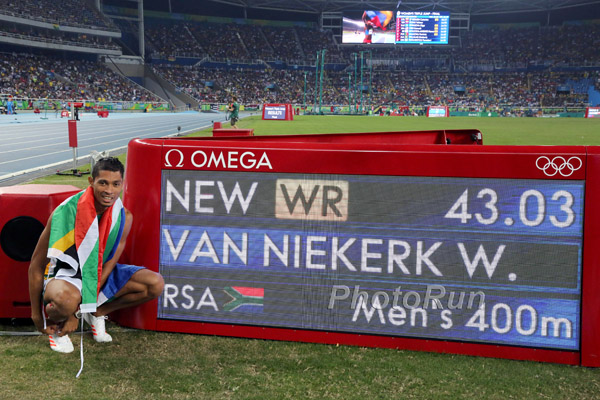43.03 From Lane 8! Wayde van Niekerk Takes Down Michael Johnson’s 17-Year-Old 400M World Record to Win Olympic Gold
Kirani James Silver in 43.76, LaShawn Merritt Bronze in 43.85 as ’16, ’12 and ’08 Olympic Champions Go 1-2-3 in the Deepest Race in History
By Jonathan Gault
August 14, 2016
RIO DE JANEIRO — In a mind-boggling display of sprinting prowess, South Africa’s Wayde van Niekerk astonished a packed Olympic Stadium by running 43.03 in the men’s 400-meter final from lane 8 to break Michael Johnson‘s 17-year-old world record. Johnson’s 43.18, set at the World Championships in Seville in 1999, went unchallenged for a long time — until tonight, Jeremy Wariner‘s 43.45 at the 2007 Worlds was the closest anyone came to it. But van Niekerk, undefeated in 2016, who hinted at his potential by running 43.48 to claim the world title in Beijing last year, fully realized it tonight with his remarkable performance. Running blind on the outside, van Niekerk came off the turn a meter or two ahead of former Olympic champs Kirani James and LaShawn Merritt and proceeded to destroy them over the final 100, streaking away from the field and into the history books. It’s almost impossible to overshadow Usain Bolt on the night he won a record third straight Olympic 100-meter title, but van Niekerk did just that with his remarkable run tonight.
James’ silver-medal run was tremendous in its own right — his 43.76 was .18 faster than his winning time in London four years ago and just .02 off his personal best — but he was made to look ordinary by the incomparable van Niekerk. American LaShawn Merritt was third in 43.85, as three men broke 44 seconds in the same race for just the second time in history (the first came last year in Beijing, accomplished by the same three men). It was also the second time in history that all eight runners broke 45 seconds. Undoubtedly, this was the deepest 400-meter race ever contested. Merritt and James in second and third were the only men who did not run an all-time best mark for place.
Heading into the race, there was some uncertainty about how van Niekerk would fare from lane eight. Van Niekerk looked great in his semifinal on Saturday, cruising through in 44.45, but his let-up at the line meant that he did not win the heat, sending him to the outermost lane in the final. Theoretically, because the turn is the most gradual in lane 8, running there could be thought of as an advantage as the runner would not have to turn as sharply. But few sprinters view it as such because they are forced to run blind — because of the stagger, they can’t tell where they stand in comparison to the other runners on their inside. Which made van Niekerk’s run even more amazing.
“I don’t think any athlete really wants to be in lane 8,” van Niekerk said. “But the moment I had it, I knew it has its advantages and it has its disadvantages. You have the perfect opportunity to [go out there and run as hard as you can].”
Once the gun went off Van Niekerk, James and Merritt all got out hard and quickly began to separate from the rest of the field. Coming off the final bend, van Niekerk held a slight lead with James and Merritt neck and neck behind him. But van Niekerk quickly found another gear, and the final 50 meters he was running totally alone.
At that point, van Niekerk had not seen another soul during the race.
“I can’t even tell you what happened in the race. I had no idea — I was blind,” van Niekerk said.
Worried that one of the Olympic champions on his inside would catch him late, van Niekerk ran hard all the way and even dipped at the line. The clock stopped at 43.03 seconds, and once van Niekerk noticed the time, he threw his hands up and covered his face in disbelief. Shortly thereafter, “World Record” flashed on the video board and the Olympic Stadium erupted.
James and Merritt have engaged in one of the best rivalries in the sport over the past five years, so it was only appropriate that those were the two men fighting it out for silver in the final stretch. Essentially even for the entire race, James edged ahead — just barely — with 50 to go and held that narrow margin all the way to the line to take second. Merritt had to settle for the bronze, becoming the fourth American (after Wariner, Johnson and Steve Lewis) to earn two Olympic medals in the men’s 400.
Results
| POS | BIB | ATHLETE | MARK | DETAIL | REACTION TIME |
|---|---|---|---|---|---|
| 1 | 2910 | Wayde VAN NIEKERK RSA RSA |
43.03 | WR | 0.181 |
| 2 | 2539 | Kirani JAMES GRN GRN |
43.76 | SB | 0.134 |
| 3 | 3090 | LaShawn MERRITT USA USA |
43.85 | SB | 0.204 |
| 4 | 2977 | Machel CEDENIO TTO TTO |
44.01 | NR | 0.203 |
| 5 | 2125 | Karabo SIBANDA BOT BOT |
44.25 | PB | 0.164 |
| 6 | 2171 | Ali Khamis KHAMIS BRN BRN |
44.36 | NR | 0.148 |
| 7 | 2540 | Bralon TAPLIN GRN GRN |
44.45 | 0.181 | |
| 8 | 2461 | Matthew HUDSON-SMITH GBR GBR |
44.61 | 0.138 |
Quick Take #1: 43.03 — what more needs to be said?
Johnson’s record had gone unchallenged for many years, and though it seemed possible after van Niekerk’s run in Beijing last year, few would have predicted it tonight. Van Niekerk hadn’t even broken 44 seconds this year until tonight, and had to start from lane 8. But his greatness was overwhelming, and the result was a truly outstanding time. And let’s pour one out for Michael Johnson, who saw another one of his world records go down in an Olympic final (Bolt broke his 200 mark eight years ago). Johnson still has his name in the record books however, as he holds all-time bests for 300 meters (30.85) and as part of the USA’s 4×400 relay (2:54.29).
Quick Take #2: This was track and field at its finest
Heading into the Olympics, the men’s 400 was hyped as one of the best events of the entire track and field program. Somehow, it managed to exceed the hype, and the result was a truly outstanding footrace. In our sport, it doesn’t get better than a world record in an Olympic final.
Quick Take #3: This race was ridiculously deep
Trinidad & Tobago’s Machel Cedenio set a national record of 44.01 seconds, a time that would have medalled in every other Olympics in history. Heck, in all but two Olympics (1968, 1988), it would have been good enough for silver. He was fourth tonight.
Botswana’s Karabo Sibanda — who turned 18 a month ago, by the way — ran 44.25. That time would have medalled in all but two Olympics (1988, 1992). He was fifth.
In fact, everyone but last placer Matthew Hudson-Smith of Great Britain — who has the unfortunate distinction of being the fastest last placer in history — would have won an Olympic medal in 2012 with their times tonight. In 2008, even Hudson-Smith would have won one — a silver, in fact — if he replicated his time from tonight.
What it’s taken to medal in the past seven men’s Olympic 400s
2016: 43.85
2012: 44.52
2008: 44.80
2004: 44.42
2000: 44.70
1996: 44.53
1992: 44.24
1988: 44.09
Quick Take #4: Usain Bolt and his coach Glen Mills were full of praise for van Niekerk’s performance
Van Niekerk spent some time with Bolt’s training group in Kingston in early June and after getting a look at the South African up front, both Bolt and Mills were impressed. During his stay, Bolt went up to van Niekerk and said: “My coach says you’re probably the only guy other than me who could break the 400 world record because you’ve got speed and you’ve got strength.”
Bolt said that if Mills had his way, Bolt would have been running the 400 at these Olympics instead but Bolt always manages to convince him to keep doing the 100.


